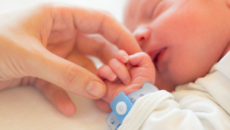New parents often contend with conflicting or erroneous medical advice. Here are a few misconceptions we’ve encountered in families adopting internationally:
Misconception: All immunizations should be given because we can’t be sure if children have been appropriately immunized.
In cases where there is incomplete documentation or none at all, blood testing after your child arrives home can help sort out whether he is protected against vaccine-preventable diseases. The tests are not always accurate, so many doctors will recommend revaccination to ensure your child is protected. It’s safe for children to be revaccinated, even if the vaccination was already received before adoption.
Misconception: All infants should be placed on a special formula for lactose intolerance.
While lactose intolerance occurs more frequently in children of Asian, Native American, African, and Latino ethnicity, it is still relatively rare in infants and young children. It is best to continue with the formula used in your child’s birth country or to use a cow-milk-based formula in order to smooth the transition to your family. Intestinal symptoms can often be attributed to parasites or a change in environment, and not necessarily to the formula used.
Misconception: Only children with diarrhea should be tested for parasites.
While diarrhea is a frequent symptom of protozoal parasites, it is not common in children with intestinal parasites. They may have poor growth, abdominal pains, cramping, diarrhea, constipation, foul smelling stools, irritability—or no symptoms at all. And a child may not recognize as abnormal symptoms he has lived with for a long time. Parasite testing is recommended for all internationally adopted children.
Misconception: Repeat testing for infectious diseases is not needed if tests were done in the child’s birth country.
Most children will have birth country documentation of testing for HIV, hepatitis B, syphilis, and sometimes hepatitis C and tuberculosis. Because several of these have long incubation periods, testing soon after arrival and again six months later is important to assure that your child did not become infected shortly before coming home.
Misconception: Tuberculosis testing should not be done if a child has received a tuberculosis vaccine.
The BCG vaccine can cause a tuberculin skin test (TST) to be reactive. However, because tuberculosis is such a serious disease, it is recommended that all internationally adopted children be tested and the history of BCG vaccine be disregarded when reading the TST.






